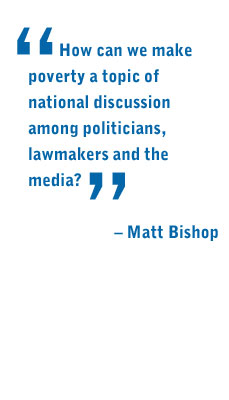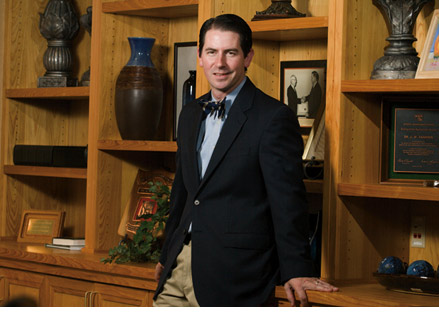


Owning Up To Poverty In America
by Matt Bishop

![]()
Products of UGA's Initiative On Poverty and the Economy

You can count on one hand the number of times poverty was mentioned in the last presidential, gubernatorial and congressional races. It seems that few leaders, especially those running for office, want to talk about poverty. Granted, 2004 vice-presidential candidate John Edwards talked about poverty nearly every time he spoke, but we know where that got him. Even Hurricane Katrina, the natural disaster that highlighted some of the poorest living conditions in America, wasn’t able to make poverty a topic of national discussion.
Despite a lack of focus in the public arena, poverty remains a crippling national problem. The latest Census figures show that nearly 37 million Americans are poor, equating to a national rate of about 13 percent. Sadly, children and youth are disproportionately affected; the poverty rate for those under 17 is about 18 percent. Minorities, too, are disproportionately affected. The Hispanic poverty rate is 22 percent, while the black poverty rate is a shameful 25 percent.
When we consider how poverty is measured in America, the statistics could—and should—look much worse. For example in 2005, a family of four (two adults, two children) with an income of $19,806 or below was considered poor. But the latest ratings don’t consider a family of four poor when they live on $19,807—just a dollar more a year. Nor do federal poverty thresholds account for geographic or cost-of-living differences. Perhaps under-reporting poverty is why it receives so little attention in America. If the data don’t point to a problem, then why should leaders try to address poverty as an issue of concern?

The federal government’s insistence on ignoring alternative measures of poverty, such as self-sufficiency standards, livable wages, and costs of living indexes, certainly doesn’t encourage any serious debate over how to reduce poverty in America. If the measure of poverty is grossly understated, then perhaps some of the causes and consequences of poverty will be enough to spark concern and action.
Poverty is both the cause and consequence of many of our society’s major ills. It limits the performance and effectiveness of our educational systems, increases the costs of health services, skews how tax dollars are generated and spent to support social services, and hobbles the ability of employers to compete in the global economy. Moreover, poverty can make or break deals when a business or industry decides to relocate or expand to a community. Even property values are lower in and around impoverished neighborhoods.
Go to a community’s poor neighborhoods and you’ll find a lack of investment in housing and retail establishments. Poor neighborhoods have disproportionately low home-ownership rates as well as a lack of adequate and affordable housing. Supermarkets and larger retailers are often absent, forcing the poor to purchase goods and services at higher prices. Banks and investment firms rarely locate in poor neighborhoods, which results in predatory lending practices such as pay-day and title-lending, with interest rates for borrowing money as high as 400 percent. Ironically even fuel prices are higher in poor neighborhoods than in affluent neighborhoods.
From a personal viewpoint, the poor face many logistical challenges in acquiring the marketable skills to effectively compete in the workforce. Their challenges include the negative stereotypes that the poor are derelict citizens and have personal flaws that preclude them from finding gainful employment. The working poor are often not covered by employer-sponsored health benefits, and those who are often face exorbitant co-pays and deductibles. Those who purchase private insurance don’t receive competitive rates or coverage. And without insurance, the poor in need of medical attention have few alternatives other than the emergency room.
The working poor also face transportation challenges because owning an automobile is often cost-prohibitive. Those who can purchase a vehicle, pay higher interest rates, either because of a lack of credit or a less-than-stellar credit history. Those who can’t afford a vehicle, often also lack access to nearby public transportation. And finally, because the poor often work multiple jobs and long hours, they have trouble securing reliable, high-quality child care. Even when they can pay for day care, their hours usually aren’t consistent with those of traditional day care centers.
All of these conditions illustrate why poverty is a much bigger problem in America than can be defined by income thresholds. We should get the message that poverty must be discussed in light of the causes and consequences it has for individuals and communities alike. The natural question then is: How do we examine poverty in terms of the broader societal implications that affect all citizens, whether poor or not? More importantly, how can we make poverty a topic of national discussion among politicians, lawmakers and the media?
One way is through interdisciplinary, applied research that informs public policy. Academia must examine not only how poverty influences individuals and families suffering from the conditions of poverty, but it must also quantify the overall costs and consequences to society in general. To this end, the University of Georgia is taking the lead through its Initiative on Poverty and the Economy.
Created in response to the 2001 study “Persistent Poverty in the South,” which identified a 242-county region of persistent poverty, the initiative is identifying, developing and supporting public policy that promotes both individual economic well-being and community prosperity. It also seeks to address the underlying issues associated with persistent poverty and serves as a bridge between teaching, research, service and public policy. UGA’s Initiative on Poverty and the Economy will also serve as a useful model for other universities and communities willing to address the realities of poverty, even if the government won’t.
Matt Bishop is on the Public Service faculty in the University of Georgia’s Fanning Institute, where he is responsible for poverty research and analysis of community and economic development policy for UGA’s Initiative on Poverty and the Economy.
To learn more about UGA’s Initiative on Poverty and the Economy, visit the website at www.poverty.uga.edu.
For comments or for information please e-mail: rcomm@uga.edu
To contact the webmaster please email: ovprweb@uga.edu
![]()